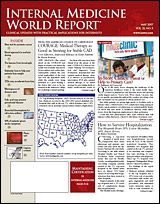Publication
Article
Internal Medicine World Report
Acupuncture Reduces Pain in Osteoarthritis
Author(s):
Patients with osteoarthritis (OA) are increasingly turning away from antiinflammatory drugs, because of their known side effects, and choosing acupuncture for the relief of the chronic pain associated with their condition. Acupuncture has been studied in relation to many conditions, with varying results. New evidence now shows that when combined with routine care, acupuncture therapy can result in marked reductions in the chronic hip and knee pain associated with OA (Arthritis Rheum. 2006; 54:3485-3493).
Between July 2001 and July 2004, some 3553 patients with chronic pain associated with OA of the hip or knee were divided into 3 groups: 322 participants received up to 15 sessions of acupuncture in the initial 3 months; 310 participants (control group) received no acupuncture in the first 3 months; and 2921 participants who did not consent to randomization received the same treatment as the acupuncture group.
All patients were followed for a total of 6 months. The Western Ontario and McMaster Universities Osteoarthritis Index (WOMAC) and a health-related quality-of-life survey were conducted at baseline and at 3 and 6 months.
At 3 months, WOMAC scores had improved by a mean of 17.6 points in the acupuncture group and 0.9 in the control group (P <.001). Quality-of-life measures also improved in the acupuncture group compared with the controls (P <.001). The outcomes in the nonrandomized group were comparable to those in the patients who are randomized to acupuncture.
“Patients with chronic pain due to osteoarthritis of the knee or hip who were treated with acupuncture in addition to routine care showed significant improvements in symptoms and quality of life compared with patients who received routine care alone,” the authors write.
The investigators note that although the mechanism of acupuncture is still not fully understood, evidence from this study, as well as previous data, clearly supports the benefits of acupuncture for a variety of conditions, including OA.
In an accompanying editorial (pages 3375-3377) Tao Liu, MD, and Chen Liu, MD, of Jilin University, Changchun, Jilin, China, point out that acupuncture follows traditional Chinese medicine, which emphasizes the body’s own healing power and aims at long-term healing rather than a cure.
In addition, acupuncture involves a close patient—provider relationship, with enhanced interaction and communication, which can be beneficial in OA, they write.
Drs Liu and Liu note that this study was limited in that the patient informed consent process was unclear, and some characteristics were not described, such as whether patients had previously tried acupuncture and what their experience had been. The acupuncturist’s level of expertise is the most important factor in treatment outcome, they suggest.






